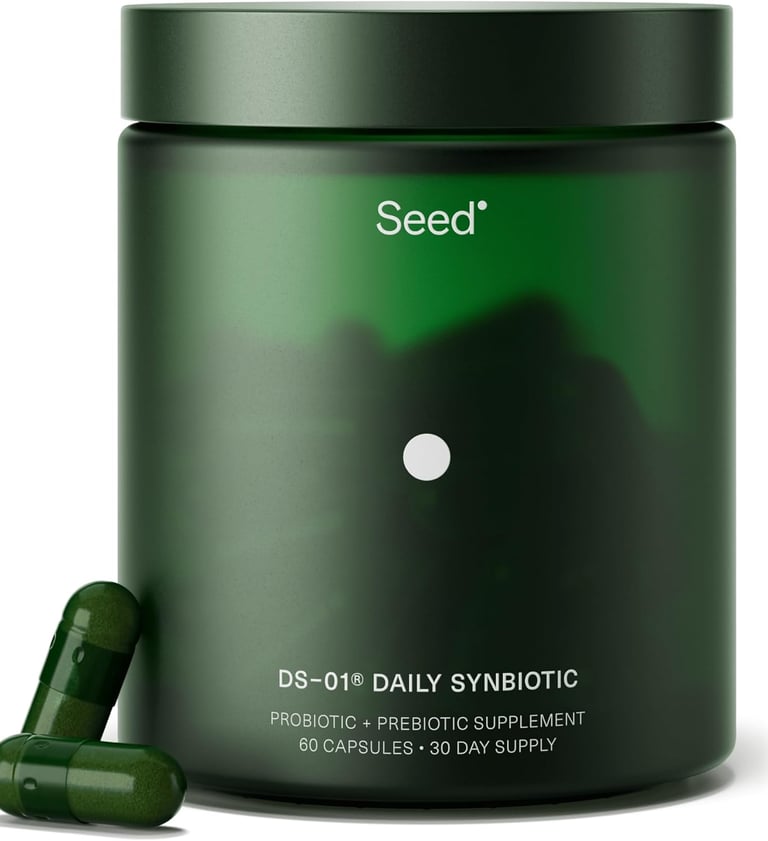5 Signs Your Gut Health Is Poor (And How to Fix It Naturally)
If you're constantly dealing with bloating, low energy, breakouts, or irregular digestion, your gut may be trying to tell you something. This guide breaks down the top signs of poor gut health and simple, natural ways to support your digestion, microbiome, and overall well-being.
3 min read

Your gut health affects so much more than just digestion. It influences your energy levels, mood, immune system, and even your skin. Many people struggle with subtle signs that their gut isn’t functioning optimally, like bloating, fatigue, irregular digestion, or unexpected skin issues. The good news? Supporting your gut naturally is possible with simple lifestyle changes, nutrient-rich foods, and science-backed supplements. In this post, we’ll explore five common signs of poor gut health and share practical tips to help restore balance and support your overall wellness.
1. Persistent Bloating
Bloating after every meal isn’t normal—it’s often a sign of imbalanced gut bacteria, slow digestion, or food intolerances. Occasional bloating happens to everyone, but frequent swelling, pressure, or discomfort usually indicates that your gut microbiome needs support. Over time, chronic bloating can also interfere with nutrient absorption and overall energy levels.
How to help:
Add fermented foods like kefir, kimchi, or sauerkraut to introduce beneficial bacteria into your digestive system.
Try a high-quality probiotic to restore balance and improve gut function.
Eat slower and avoid overeating to reduce stress on your digestive tract.
Reduce artificial sweeteners and processed foods, which can feed harmful bacteria and contribute to inflammation.
2. Irregular Bowel Movements
Constipation, diarrhea, or constantly alternating between the two are major indicators of digestive imbalance. A healthy gut should allow for consistent, comfortable bowel movements, ideally once or twice per day. Irregularity can indicate an overgrowth of harmful bacteria or insufficient fiber in your diet.
How to help:
Increase fiber from whole foods like fruits, vegetables, legumes, and whole grains to support smooth digestion.
Drink more water throughout the day to help move waste efficiently through the intestines.
Incorporate magnesium or digestive enzymes if you need extra support for regularity.
Add prebiotic foods like onions, garlic, and oats, which feed the beneficial bacteria in your gut.
3. Low Energy & Fatigue
Your gut plays a key role in absorbing the nutrients your body needs to produce energy. When it’s inflamed or imbalanced, nutrient absorption is impaired, which can leave you feeling tired, sluggish, or mentally foggy. Chronic fatigue is often overlooked as a gut issue, but supporting digestion can make a big difference.
How to help:
Balance your blood sugar with protein-rich meals to avoid energy crashes.
Add a daily synbiotic (combination of prebiotics and probiotics) to nourish beneficial bacteria and improve gut function.
Reduce caffeine dependency, which can disrupt gut bacteria and digestion over time.
Prioritize 7–9 hours of quality sleep each night to give your body time to repair and restore gut health.
4. Skin Issues (Acne, Eczema, Dullness)
The gut–skin connection is real. When gut bacteria are out of balance, inflammation can increase, often manifesting on the skin. Breakouts, redness, dryness, eczema, or dull skin may all be tied to poor gut health. Supporting the microbiome can improve skin appearance and overall wellness.
How to help:
Support your microbiome with probiotics to reduce systemic inflammation.
Add anti-inflammatory foods like berries, leafy greens, and turmeric to your diet.
Reduce stress through mindfulness, movement, or meditation, as stress directly impacts your gut lining and, in turn, your skin.
5. Frequent Food Sensitivities
If you suddenly react to foods you used to tolerate, your gut lining may be compromised, which can lead to inflammation and increased sensitivity. Food sensitivities often signal that your microbiome is out of balance or that intestinal permeability (“leaky gut”) may be an issue.
How to help:
Temporarily remove trigger foods that cause discomfort and reintroduce them slowly once symptoms improve.
Focus on whole, simple meals rich in fiber, protein, and healthy fats.
Add gut-supporting supplements like L-glutamine or collagen to help repair the gut lining.
How to Improve Your Gut Health Naturally
Supporting your digestive system doesn’t have to be complicated. Adding a daily probiotic or synbiotic helps restore balance and reduce bloating, while eating more prebiotic fiber feeds the good bacteria in your gut for long-term microbiome health. Reducing stress, prioritizing whole foods, and staying hydrated all make a significant difference over time. Small, consistent changes are more effective than drastic overnight fixes.
Final Thoughts
Your gut is at the center of your health—from digestion and immunity to energy and skin. If you’re experiencing any of these signs, simple daily changes can help restore balance naturally. Start by supporting your microbiome, eating more whole foods, and nourishing your body from the inside out. Over time, these habits can reduce bloating, improve energy, calm inflammation, and even support clearer skin. Your gut will thank you. 🌿
If you want more natural wellness tips, supplement recommendations, and gut health guides, check out more posts on my blog!


